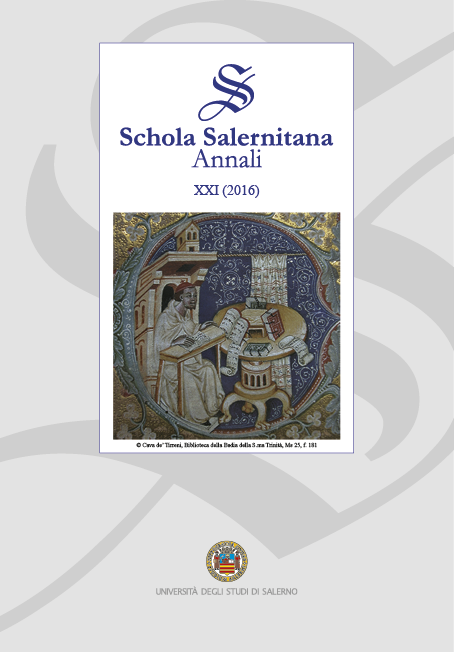The sources of medieval economic history
DOI:
https://doi.org/10.6092/1590-7937/4096Keywords:
economic history, Archaeology, moneyAbstract
From the economic point of view, the Middle Ages is characterized by three different phases (one of growth between two crises). Except for the late Middle Ages (which has preserved specific economic documentation), the economic history of the Middle Ages resorts to unspecific economic sources, in order to describe general trends which cannot be precisely quantified.Downloads
References
Chronicon Sanctae Sophiae: (cod Vat. Lat. 4939), edizione e commento a cura di J-_M. MARTIN con uno studio sull'apparato decorativo di G. OROFINO, Roma, 2 voll. Roma 2000 (Fonti per la Storia dell'Italia Medievale. Rerum Italicarum Scriptores, 3*-3**).
Codex diplomaticus Cavensis, curantibus M. MORCALDI, M. SCHIANI, S. de Stephano; accedit appendix qua praecipua bibliothecae ms. membranacea describuntur per B. Caietano de Aragonia, vol. I-VIII, Napoli 1873-1893 (ristampa Badia di Cava [1981]).
BRÜHL C. – VIOLANTE C., Die «Honorantie civitatis Papie». Transkription, Edition, Kommentar, Kòln-Wien 1983.
I registri della cancelleria angioina ricostruiti da R. FILANGIERI con la collaborazione degli Archivisti Napoletani, Napoli 1950- (50 volumes aujourd’hui parus).
Richesse et croissance au Moyen Âge. Orient et Occident, éd. par D. BARTHÉLEMY, J.-M. MARTIN, Paris 2014 (Centre de recherche d’histoire et civilisation de Byzance, Monographies, 43).
DEVROEY J.-P., Études sur le grand domaine carolingien, Aldershot 1993.
GALANTE M., La datazione dei documenti del Codex Diplomaticus Cavensis. Appendice: edizione degli inediti, Salerno 1980.
GIBBON E., The History of the Decline and Fall of the Roman Empire, rééd. par J.B. BURY, 7 voll., London 1776-1781, 1909-1914.
Herdonia. Scoperta di una città, a cura di J. MERTENS, Bari 1995.
LA RONCIÈRE Ch.-M. de, Prix et salaires à Florence au XIVe siècle (1280-1380), Rome 1982 (Collection de l’École française de Rome, 59).
MARTIN J.-M., La Pouille du VIe au XIIe siècle, Rome 1993 (Collection de l'École française de Rome, 179).
MARTIN J.-M., L'évolution démographique de l'Italie méridionale du VIe au XIVe siècle, dans Demografia e società nell'Italia medievale (secoli IX-XIV), ed. R. COMBA, I. NASO, Cuneo 1994, pp. 351-362.
MARTIN J.-M., L'Italie méridionale, dans Città e campagna nei secoli altomedievali (Spoleto, 27 marzo-1 aprile 2008), vol. II, Spoleto 2009, p. 733-774 (Centro italiano di studi sull'alto medioevo. Atti delle Settimane, 56).
PIRENNE H., Mahomet et Charlemagne, rééd., Paris 2005.
TRAVAINI L., La monetazione nell’Italia normanna, Roma 1980 (Nuovi Studi Storici, 28).
VOLPE G., Herdonia romana, tardoantica e medievale alla luce dei recenti scavi, dans Ordona X, sous la dir. de G. VOLPE, Bari, 2000 (Études de philologie, d'archéologie et d'histoire anciennes publiées par l'Institut historique belge de Rome, 38. Scavi e ricerche, 12), pp. 507-557.
WICKHAM Ch., Framing the Early Middle Ages. Europe and the Mediterranean, 400-800, Oxford 2005.
Le zecche italiane fino all’Unità, a cura di L. TRAVAINI, 2 voll. Roma 2011.
Downloads
Published
How to Cite
Issue
Section
License
Authors who publish works in this journal agree to the following terms:
a. They retain the copyright but grant the journal the right of first publication of the work licensed under a Creative Commons Attribution 4.0 International License that allows others to reproduce, share, distribute, communicate with the public, exhibit, represent, perform the work with an acknowledgement of the work's authorship (quoting clearly the author and title of the journal).
b. They are able to enter into separate, additional contractual arrangements for the non-exclusive distribution of the journal's published version of the work (e.g., post it to an institutional repository or publish it in a book), with an indication of its initial publication in SSA.
c. At the time of the proposed publication, authors are required to declare that the content and organization of their work is original and do not in any way compromise the rights of third parties or the obligations related to the preservation of moral and economic rights of other authors or other beneficiaries, both of the texts, images, pictures, tables, and other parts of the contribution. They also declare to be aware of the penalties of the Penal Code and special laws concerning forgery and use of false documents. Schola Salernitana - Annali is free from any civil, administrative or criminal responsibility, and the author will preserve the journal from any claim or demand by a third party.





